Report on Strategic Management and Corporate Social Responsibility
VerifiedAdded on 2023/04/23
|7
|1923
|66
Report
AI Summary
This report critically reviews an article on corporate social responsibility (CSR) and strategic management, focusing on the interplay between these two key organizational functions. The analysis examines the author's review of books and articles, highlighting the role of CSR in strategic decision-making and its impact on long-term organizational objectives such as profit maximization and wealth creation. It discusses the importance of stakeholder interests, the influence of government intervention, and the challenges faced by management in implementing CSR programs. The report also points out the limitations of the reviewed article, such as overlooking the significance of small and medium-sized enterprises (SMEs) in CSR activities. Ultimately, the report concludes that while the article provides a comprehensive overview of different perspectives on CSR, it lacks a unique perspective on the relationship between strategic management and CSR, particularly in the context of global societal advancement. Desklib offers a wealth of similar student-contributed assignments and study resources to aid in your academic journey.
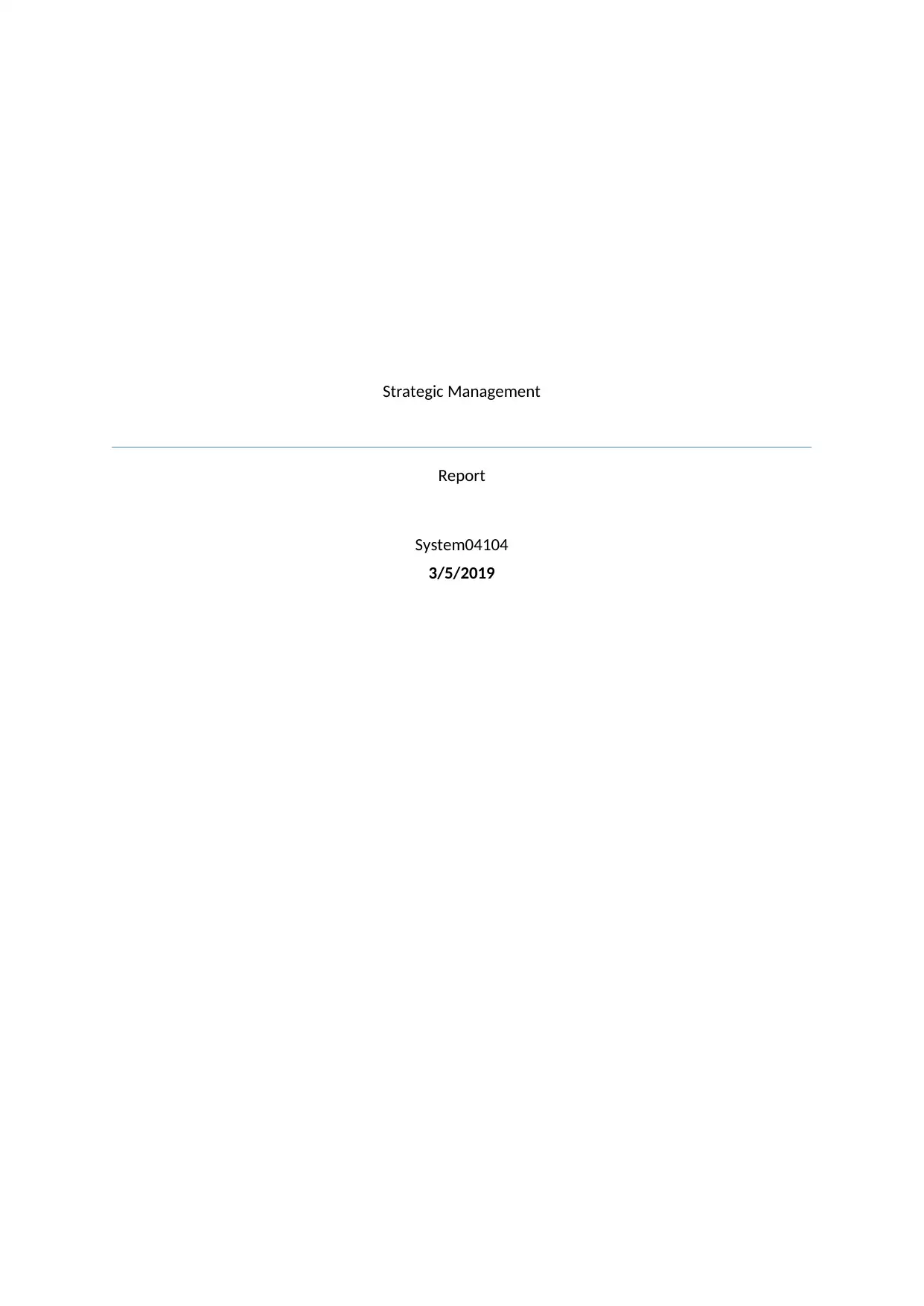
Strategic Management
Report
System04104
3/5/2019
Report
System04104
3/5/2019
Paraphrase This Document
Need a fresh take? Get an instant paraphrase of this document with our AI Paraphraser
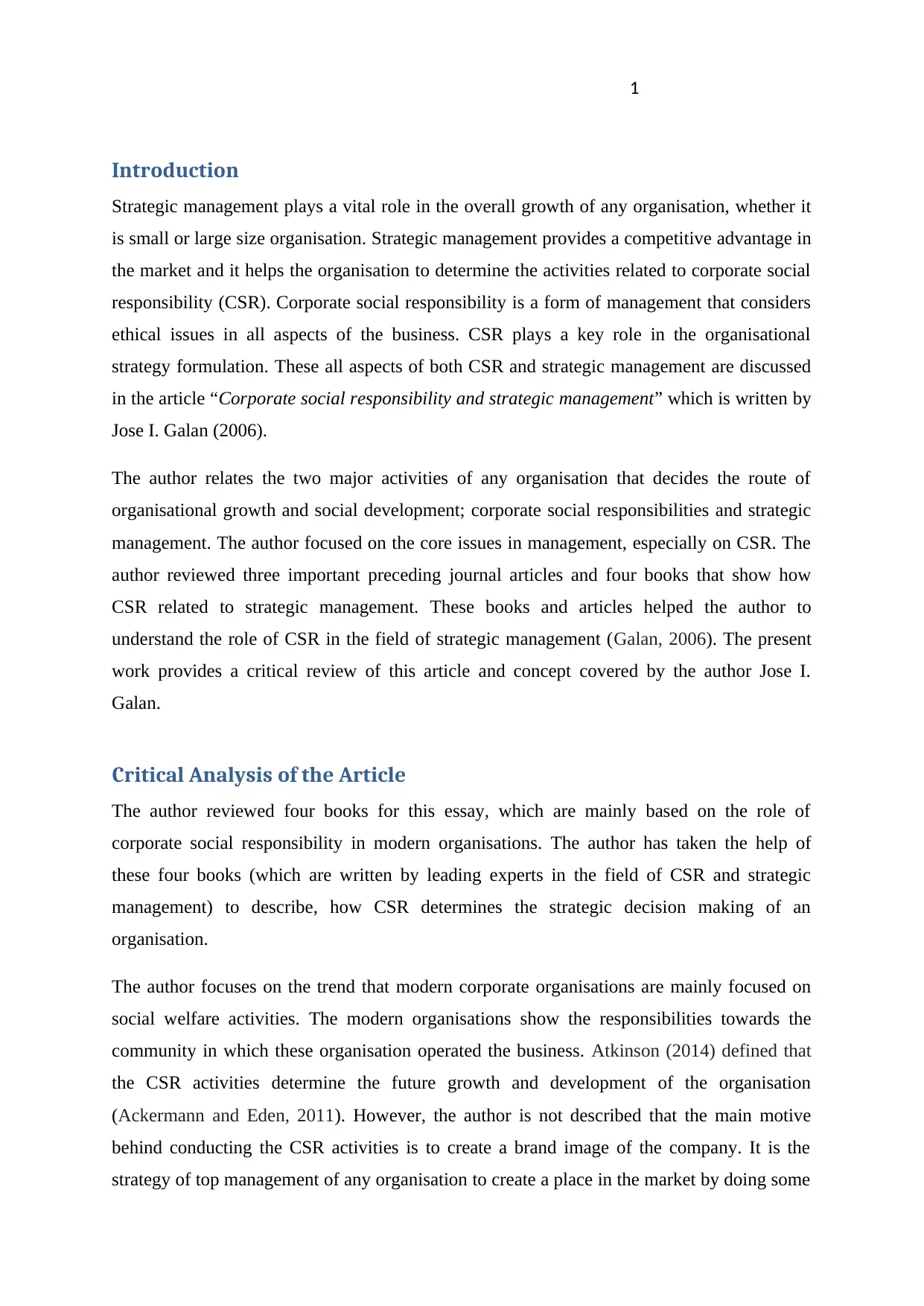
1
Introduction
Strategic management plays a vital role in the overall growth of any organisation, whether it
is small or large size organisation. Strategic management provides a competitive advantage in
the market and it helps the organisation to determine the activities related to corporate social
responsibility (CSR). Corporate social responsibility is a form of management that considers
ethical issues in all aspects of the business. CSR plays a key role in the organisational
strategy formulation. These all aspects of both CSR and strategic management are discussed
in the article “Corporate social responsibility and strategic management” which is written by
Jose I. Galan (2006).
The author relates the two major activities of any organisation that decides the route of
organisational growth and social development; corporate social responsibilities and strategic
management. The author focused on the core issues in management, especially on CSR. The
author reviewed three important preceding journal articles and four books that show how
CSR related to strategic management. These books and articles helped the author to
understand the role of CSR in the field of strategic management (Galan, 2006). The present
work provides a critical review of this article and concept covered by the author Jose I.
Galan.
Critical Analysis of the Article
The author reviewed four books for this essay, which are mainly based on the role of
corporate social responsibility in modern organisations. The author has taken the help of
these four books (which are written by leading experts in the field of CSR and strategic
management) to describe, how CSR determines the strategic decision making of an
organisation.
The author focuses on the trend that modern corporate organisations are mainly focused on
social welfare activities. The modern organisations show the responsibilities towards the
community in which these organisation operated the business. Atkinson (2014) defined that
the CSR activities determine the future growth and development of the organisation
(Ackermann and Eden, 2011). However, the author is not described that the main motive
behind conducting the CSR activities is to create a brand image of the company. It is the
strategy of top management of any organisation to create a place in the market by doing some
Introduction
Strategic management plays a vital role in the overall growth of any organisation, whether it
is small or large size organisation. Strategic management provides a competitive advantage in
the market and it helps the organisation to determine the activities related to corporate social
responsibility (CSR). Corporate social responsibility is a form of management that considers
ethical issues in all aspects of the business. CSR plays a key role in the organisational
strategy formulation. These all aspects of both CSR and strategic management are discussed
in the article “Corporate social responsibility and strategic management” which is written by
Jose I. Galan (2006).
The author relates the two major activities of any organisation that decides the route of
organisational growth and social development; corporate social responsibilities and strategic
management. The author focused on the core issues in management, especially on CSR. The
author reviewed three important preceding journal articles and four books that show how
CSR related to strategic management. These books and articles helped the author to
understand the role of CSR in the field of strategic management (Galan, 2006). The present
work provides a critical review of this article and concept covered by the author Jose I.
Galan.
Critical Analysis of the Article
The author reviewed four books for this essay, which are mainly based on the role of
corporate social responsibility in modern organisations. The author has taken the help of
these four books (which are written by leading experts in the field of CSR and strategic
management) to describe, how CSR determines the strategic decision making of an
organisation.
The author focuses on the trend that modern corporate organisations are mainly focused on
social welfare activities. The modern organisations show the responsibilities towards the
community in which these organisation operated the business. Atkinson (2014) defined that
the CSR activities determine the future growth and development of the organisation
(Ackermann and Eden, 2011). However, the author is not described that the main motive
behind conducting the CSR activities is to create a brand image of the company. It is the
strategy of top management of any organisation to create a place in the market by doing some
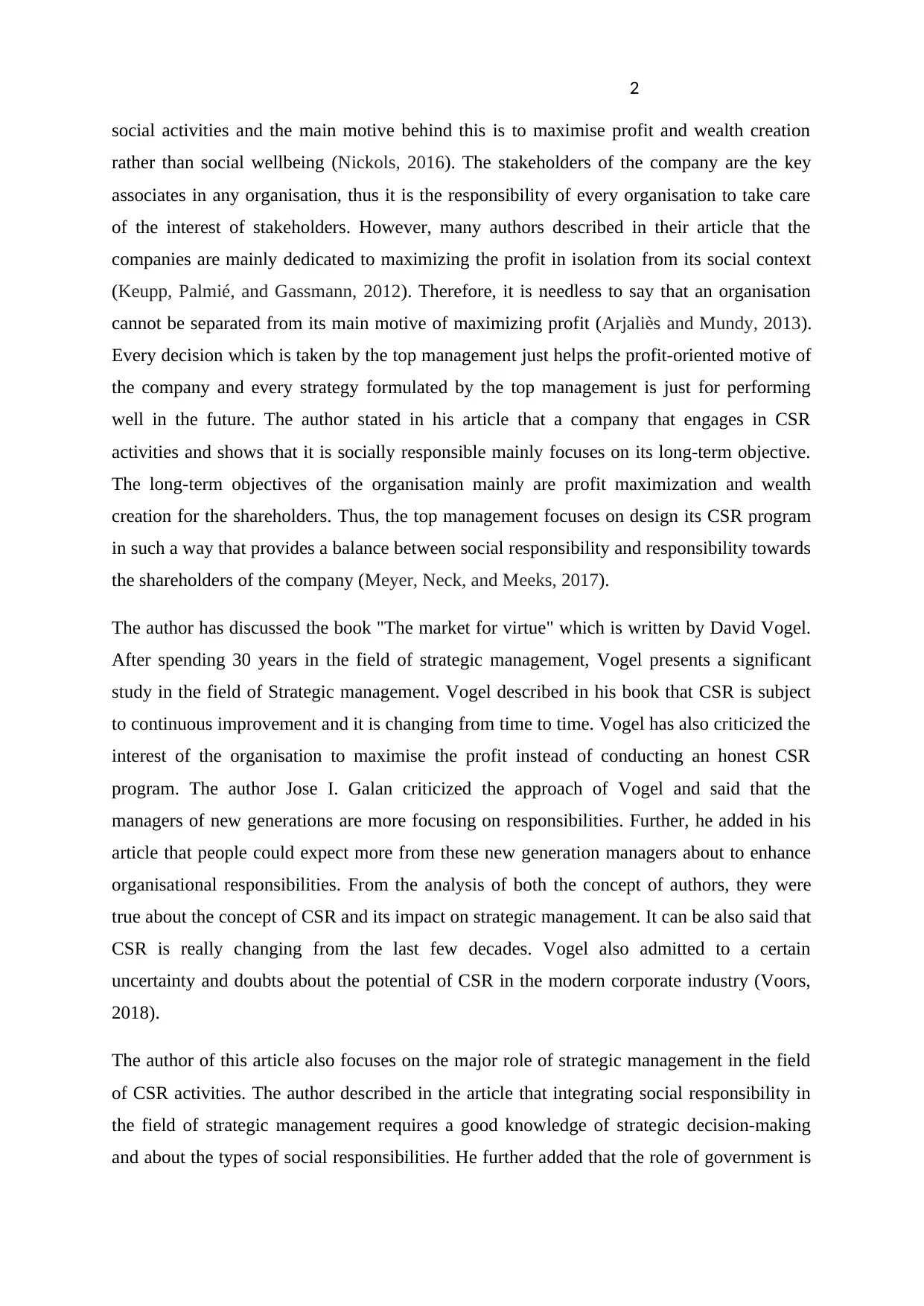
2
social activities and the main motive behind this is to maximise profit and wealth creation
rather than social wellbeing (Nickols, 2016). The stakeholders of the company are the key
associates in any organisation, thus it is the responsibility of every organisation to take care
of the interest of stakeholders. However, many authors described in their article that the
companies are mainly dedicated to maximizing the profit in isolation from its social context
(Keupp, Palmié, and Gassmann, 2012). Therefore, it is needless to say that an organisation
cannot be separated from its main motive of maximizing profit (Arjaliès and Mundy, 2013).
Every decision which is taken by the top management just helps the profit-oriented motive of
the company and every strategy formulated by the top management is just for performing
well in the future. The author stated in his article that a company that engages in CSR
activities and shows that it is socially responsible mainly focuses on its long-term objective.
The long-term objectives of the organisation mainly are profit maximization and wealth
creation for the shareholders. Thus, the top management focuses on design its CSR program
in such a way that provides a balance between social responsibility and responsibility towards
the shareholders of the company (Meyer, Neck, and Meeks, 2017).
The author has discussed the book "The market for virtue" which is written by David Vogel.
After spending 30 years in the field of strategic management, Vogel presents a significant
study in the field of Strategic management. Vogel described in his book that CSR is subject
to continuous improvement and it is changing from time to time. Vogel has also criticized the
interest of the organisation to maximise the profit instead of conducting an honest CSR
program. The author Jose I. Galan criticized the approach of Vogel and said that the
managers of new generations are more focusing on responsibilities. Further, he added in his
article that people could expect more from these new generation managers about to enhance
organisational responsibilities. From the analysis of both the concept of authors, they were
true about the concept of CSR and its impact on strategic management. It can be also said that
CSR is really changing from the last few decades. Vogel also admitted to a certain
uncertainty and doubts about the potential of CSR in the modern corporate industry (Voors,
2018).
The author of this article also focuses on the major role of strategic management in the field
of CSR activities. The author described in the article that integrating social responsibility in
the field of strategic management requires a good knowledge of strategic decision-making
and about the types of social responsibilities. He further added that the role of government is
social activities and the main motive behind this is to maximise profit and wealth creation
rather than social wellbeing (Nickols, 2016). The stakeholders of the company are the key
associates in any organisation, thus it is the responsibility of every organisation to take care
of the interest of stakeholders. However, many authors described in their article that the
companies are mainly dedicated to maximizing the profit in isolation from its social context
(Keupp, Palmié, and Gassmann, 2012). Therefore, it is needless to say that an organisation
cannot be separated from its main motive of maximizing profit (Arjaliès and Mundy, 2013).
Every decision which is taken by the top management just helps the profit-oriented motive of
the company and every strategy formulated by the top management is just for performing
well in the future. The author stated in his article that a company that engages in CSR
activities and shows that it is socially responsible mainly focuses on its long-term objective.
The long-term objectives of the organisation mainly are profit maximization and wealth
creation for the shareholders. Thus, the top management focuses on design its CSR program
in such a way that provides a balance between social responsibility and responsibility towards
the shareholders of the company (Meyer, Neck, and Meeks, 2017).
The author has discussed the book "The market for virtue" which is written by David Vogel.
After spending 30 years in the field of strategic management, Vogel presents a significant
study in the field of Strategic management. Vogel described in his book that CSR is subject
to continuous improvement and it is changing from time to time. Vogel has also criticized the
interest of the organisation to maximise the profit instead of conducting an honest CSR
program. The author Jose I. Galan criticized the approach of Vogel and said that the
managers of new generations are more focusing on responsibilities. Further, he added in his
article that people could expect more from these new generation managers about to enhance
organisational responsibilities. From the analysis of both the concept of authors, they were
true about the concept of CSR and its impact on strategic management. It can be also said that
CSR is really changing from the last few decades. Vogel also admitted to a certain
uncertainty and doubts about the potential of CSR in the modern corporate industry (Voors,
2018).
The author of this article also focuses on the major role of strategic management in the field
of CSR activities. The author described in the article that integrating social responsibility in
the field of strategic management requires a good knowledge of strategic decision-making
and about the types of social responsibilities. He further added that the role of government is
⊘ This is a preview!⊘
Do you want full access?
Subscribe today to unlock all pages.

Trusted by 1+ million students worldwide
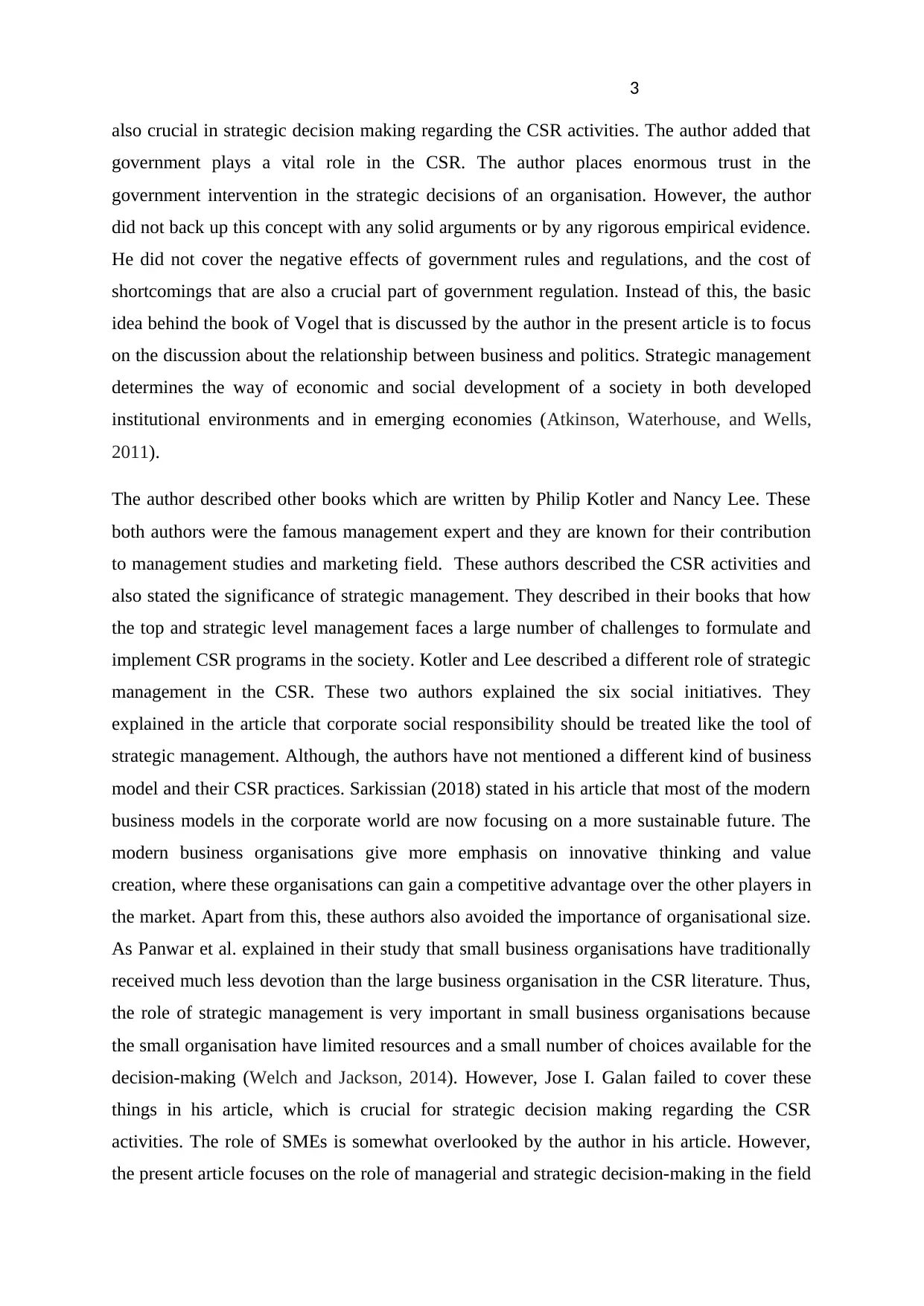
3
also crucial in strategic decision making regarding the CSR activities. The author added that
government plays a vital role in the CSR. The author places enormous trust in the
government intervention in the strategic decisions of an organisation. However, the author
did not back up this concept with any solid arguments or by any rigorous empirical evidence.
He did not cover the negative effects of government rules and regulations, and the cost of
shortcomings that are also a crucial part of government regulation. Instead of this, the basic
idea behind the book of Vogel that is discussed by the author in the present article is to focus
on the discussion about the relationship between business and politics. Strategic management
determines the way of economic and social development of a society in both developed
institutional environments and in emerging economies (Atkinson, Waterhouse, and Wells,
2011).
The author described other books which are written by Philip Kotler and Nancy Lee. These
both authors were the famous management expert and they are known for their contribution
to management studies and marketing field. These authors described the CSR activities and
also stated the significance of strategic management. They described in their books that how
the top and strategic level management faces a large number of challenges to formulate and
implement CSR programs in the society. Kotler and Lee described a different role of strategic
management in the CSR. These two authors explained the six social initiatives. They
explained in the article that corporate social responsibility should be treated like the tool of
strategic management. Although, the authors have not mentioned a different kind of business
model and their CSR practices. Sarkissian (2018) stated in his article that most of the modern
business models in the corporate world are now focusing on a more sustainable future. The
modern business organisations give more emphasis on innovative thinking and value
creation, where these organisations can gain a competitive advantage over the other players in
the market. Apart from this, these authors also avoided the importance of organisational size.
As Panwar et al. explained in their study that small business organisations have traditionally
received much less devotion than the large business organisation in the CSR literature. Thus,
the role of strategic management is very important in small business organisations because
the small organisation have limited resources and a small number of choices available for the
decision-making (Welch and Jackson, 2014). However, Jose I. Galan failed to cover these
things in his article, which is crucial for strategic decision making regarding the CSR
activities. The role of SMEs is somewhat overlooked by the author in his article. However,
the present article focuses on the role of managerial and strategic decision-making in the field
also crucial in strategic decision making regarding the CSR activities. The author added that
government plays a vital role in the CSR. The author places enormous trust in the
government intervention in the strategic decisions of an organisation. However, the author
did not back up this concept with any solid arguments or by any rigorous empirical evidence.
He did not cover the negative effects of government rules and regulations, and the cost of
shortcomings that are also a crucial part of government regulation. Instead of this, the basic
idea behind the book of Vogel that is discussed by the author in the present article is to focus
on the discussion about the relationship between business and politics. Strategic management
determines the way of economic and social development of a society in both developed
institutional environments and in emerging economies (Atkinson, Waterhouse, and Wells,
2011).
The author described other books which are written by Philip Kotler and Nancy Lee. These
both authors were the famous management expert and they are known for their contribution
to management studies and marketing field. These authors described the CSR activities and
also stated the significance of strategic management. They described in their books that how
the top and strategic level management faces a large number of challenges to formulate and
implement CSR programs in the society. Kotler and Lee described a different role of strategic
management in the CSR. These two authors explained the six social initiatives. They
explained in the article that corporate social responsibility should be treated like the tool of
strategic management. Although, the authors have not mentioned a different kind of business
model and their CSR practices. Sarkissian (2018) stated in his article that most of the modern
business models in the corporate world are now focusing on a more sustainable future. The
modern business organisations give more emphasis on innovative thinking and value
creation, where these organisations can gain a competitive advantage over the other players in
the market. Apart from this, these authors also avoided the importance of organisational size.
As Panwar et al. explained in their study that small business organisations have traditionally
received much less devotion than the large business organisation in the CSR literature. Thus,
the role of strategic management is very important in small business organisations because
the small organisation have limited resources and a small number of choices available for the
decision-making (Welch and Jackson, 2014). However, Jose I. Galan failed to cover these
things in his article, which is crucial for strategic decision making regarding the CSR
activities. The role of SMEs is somewhat overlooked by the author in his article. However,
the present article focuses on the role of managerial and strategic decision-making in the field
Paraphrase This Document
Need a fresh take? Get an instant paraphrase of this document with our AI Paraphraser
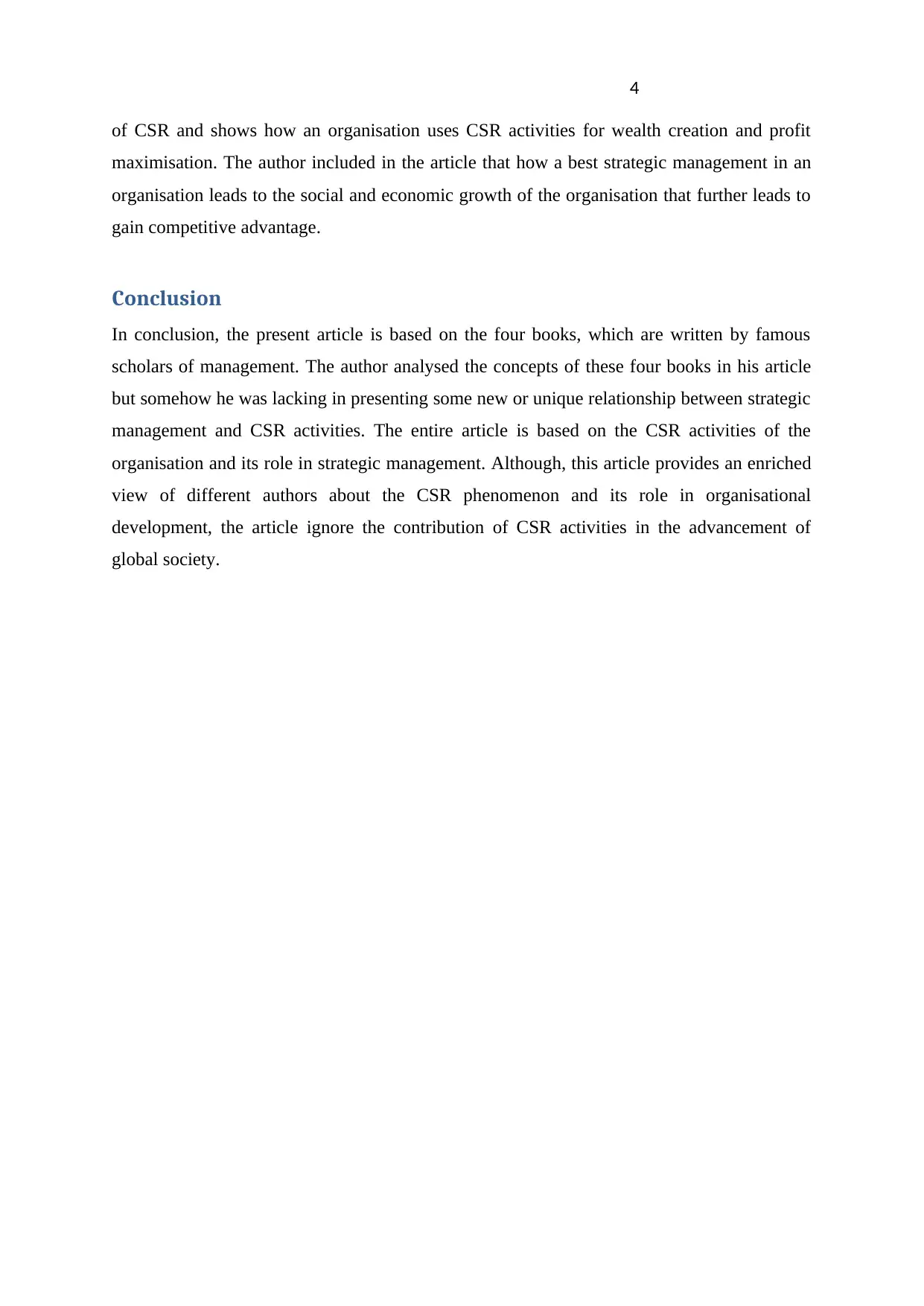
4
of CSR and shows how an organisation uses CSR activities for wealth creation and profit
maximisation. The author included in the article that how a best strategic management in an
organisation leads to the social and economic growth of the organisation that further leads to
gain competitive advantage.
Conclusion
In conclusion, the present article is based on the four books, which are written by famous
scholars of management. The author analysed the concepts of these four books in his article
but somehow he was lacking in presenting some new or unique relationship between strategic
management and CSR activities. The entire article is based on the CSR activities of the
organisation and its role in strategic management. Although, this article provides an enriched
view of different authors about the CSR phenomenon and its role in organisational
development, the article ignore the contribution of CSR activities in the advancement of
global society.
of CSR and shows how an organisation uses CSR activities for wealth creation and profit
maximisation. The author included in the article that how a best strategic management in an
organisation leads to the social and economic growth of the organisation that further leads to
gain competitive advantage.
Conclusion
In conclusion, the present article is based on the four books, which are written by famous
scholars of management. The author analysed the concepts of these four books in his article
but somehow he was lacking in presenting some new or unique relationship between strategic
management and CSR activities. The entire article is based on the CSR activities of the
organisation and its role in strategic management. Although, this article provides an enriched
view of different authors about the CSR phenomenon and its role in organisational
development, the article ignore the contribution of CSR activities in the advancement of
global society.
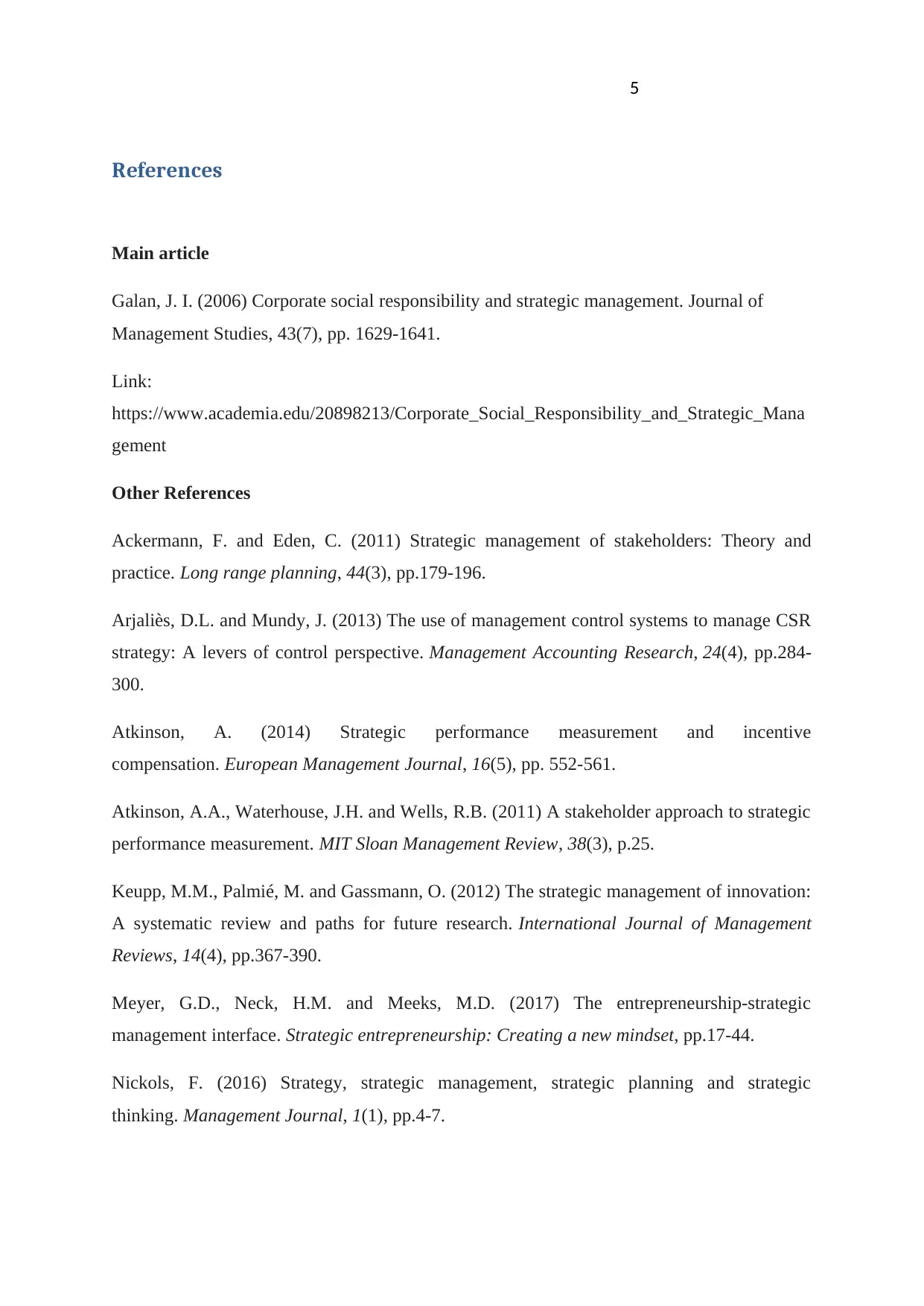
5
References
Main article
Galan, J. I. (2006) Corporate social responsibility and strategic management. Journal of
Management Studies, 43(7), pp. 1629-1641.
Link:
https://www.academia.edu/20898213/Corporate_Social_Responsibility_and_Strategic_Mana
gement
Other References
Ackermann, F. and Eden, C. (2011) Strategic management of stakeholders: Theory and
practice. Long range planning, 44(3), pp.179-196.
Arjaliès, D.L. and Mundy, J. (2013) The use of management control systems to manage CSR
strategy: A levers of control perspective. Management Accounting Research, 24(4), pp.284-
300.
Atkinson, A. (2014) Strategic performance measurement and incentive
compensation. European Management Journal, 16(5), pp. 552-561.
Atkinson, A.A., Waterhouse, J.H. and Wells, R.B. (2011) A stakeholder approach to strategic
performance measurement. MIT Sloan Management Review, 38(3), p.25.
Keupp, M.M., Palmié, M. and Gassmann, O. (2012) The strategic management of innovation:
A systematic review and paths for future research. International Journal of Management
Reviews, 14(4), pp.367-390.
Meyer, G.D., Neck, H.M. and Meeks, M.D. (2017) The entrepreneurship‐strategic
management interface. Strategic entrepreneurship: Creating a new mindset, pp.17-44.
Nickols, F. (2016) Strategy, strategic management, strategic planning and strategic
thinking. Management Journal, 1(1), pp.4-7.
References
Main article
Galan, J. I. (2006) Corporate social responsibility and strategic management. Journal of
Management Studies, 43(7), pp. 1629-1641.
Link:
https://www.academia.edu/20898213/Corporate_Social_Responsibility_and_Strategic_Mana
gement
Other References
Ackermann, F. and Eden, C. (2011) Strategic management of stakeholders: Theory and
practice. Long range planning, 44(3), pp.179-196.
Arjaliès, D.L. and Mundy, J. (2013) The use of management control systems to manage CSR
strategy: A levers of control perspective. Management Accounting Research, 24(4), pp.284-
300.
Atkinson, A. (2014) Strategic performance measurement and incentive
compensation. European Management Journal, 16(5), pp. 552-561.
Atkinson, A.A., Waterhouse, J.H. and Wells, R.B. (2011) A stakeholder approach to strategic
performance measurement. MIT Sloan Management Review, 38(3), p.25.
Keupp, M.M., Palmié, M. and Gassmann, O. (2012) The strategic management of innovation:
A systematic review and paths for future research. International Journal of Management
Reviews, 14(4), pp.367-390.
Meyer, G.D., Neck, H.M. and Meeks, M.D. (2017) The entrepreneurship‐strategic
management interface. Strategic entrepreneurship: Creating a new mindset, pp.17-44.
Nickols, F. (2016) Strategy, strategic management, strategic planning and strategic
thinking. Management Journal, 1(1), pp.4-7.
⊘ This is a preview!⊘
Do you want full access?
Subscribe today to unlock all pages.

Trusted by 1+ million students worldwide
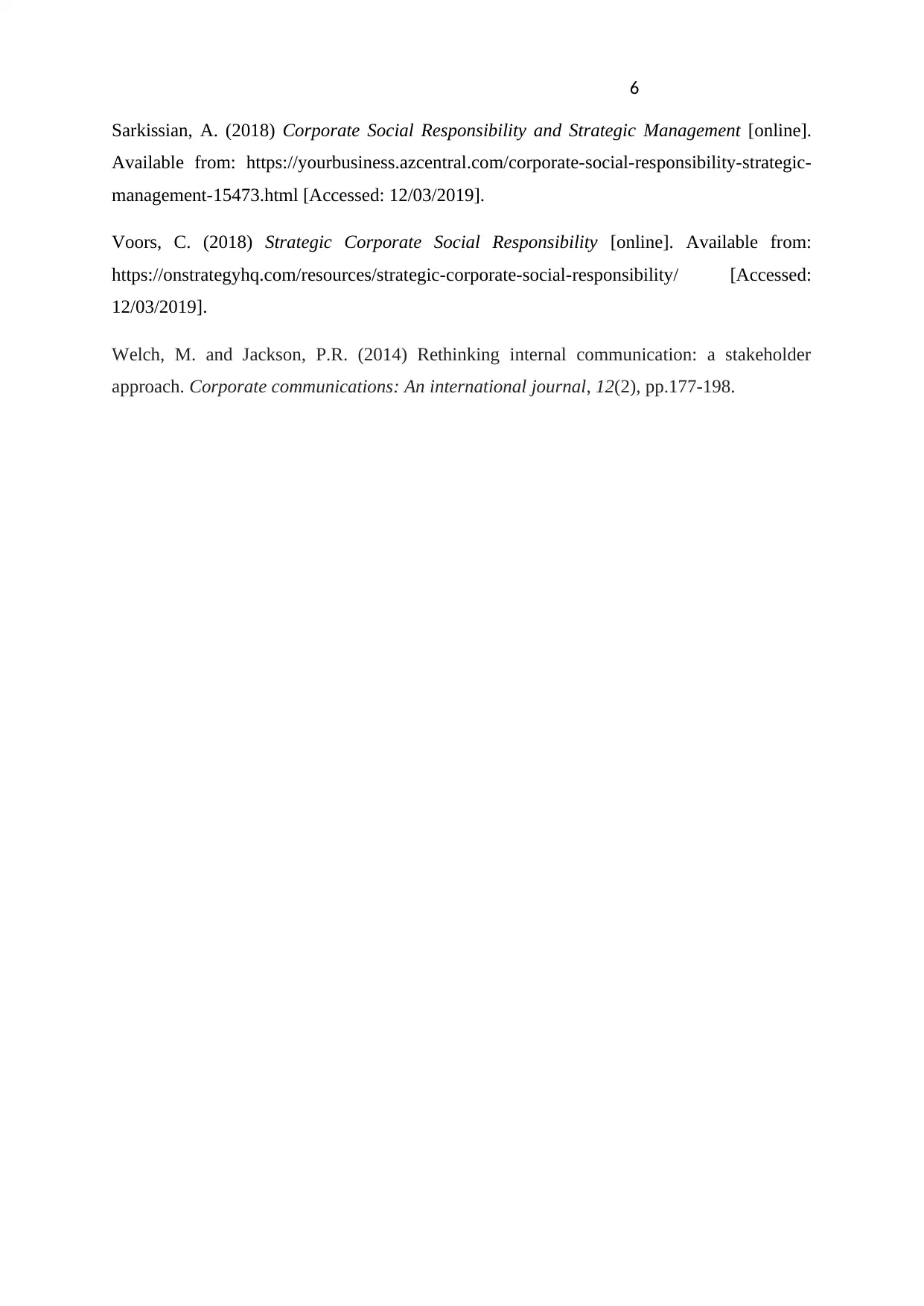
6
Sarkissian, A. (2018) Corporate Social Responsibility and Strategic Management [online].
Available from: https://yourbusiness.azcentral.com/corporate-social-responsibility-strategic-
management-15473.html [Accessed: 12/03/2019].
Voors, C. (2018) Strategic Corporate Social Responsibility [online]. Available from:
https://onstrategyhq.com/resources/strategic-corporate-social-responsibility/ [Accessed:
12/03/2019].
Welch, M. and Jackson, P.R. (2014) Rethinking internal communication: a stakeholder
approach. Corporate communications: An international journal, 12(2), pp.177-198.
Sarkissian, A. (2018) Corporate Social Responsibility and Strategic Management [online].
Available from: https://yourbusiness.azcentral.com/corporate-social-responsibility-strategic-
management-15473.html [Accessed: 12/03/2019].
Voors, C. (2018) Strategic Corporate Social Responsibility [online]. Available from:
https://onstrategyhq.com/resources/strategic-corporate-social-responsibility/ [Accessed:
12/03/2019].
Welch, M. and Jackson, P.R. (2014) Rethinking internal communication: a stakeholder
approach. Corporate communications: An international journal, 12(2), pp.177-198.
1 out of 7
Related Documents
Your All-in-One AI-Powered Toolkit for Academic Success.
+13062052269
info@desklib.com
Available 24*7 on WhatsApp / Email
![[object Object]](/_next/static/media/star-bottom.7253800d.svg)
Unlock your academic potential
Copyright © 2020–2026 A2Z Services. All Rights Reserved. Developed and managed by ZUCOL.




